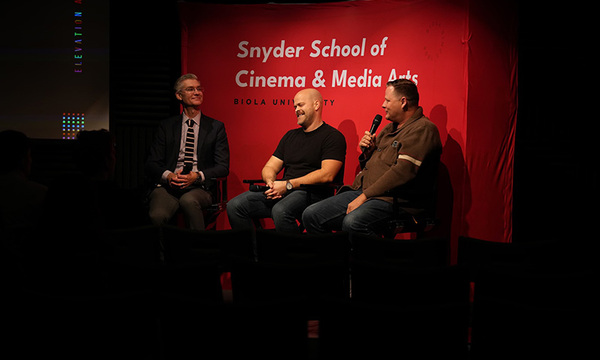Studio Artist Gary Kuo began his music career at the age of seven when his mom began teaching him piano. Little did Kuo know that his humble beginning would lead to winning multiple Emmy Awards for composition. He expanded his exploration of music the next year when he started playing violin and eventually built his own electric violin. After high school, Kuo attended Juilliard School in New York City focusing in violin performance. He continued his education at the University of Miami Frost School of Music with a masters in composition for television and film.
Kuo currently lives in Southern California and is a studio artist at Biola University as well as a television composer. Kuo joined Biola in the fall of 2015.
Kuo is best known for his work in daytime television composing and has won six emmys with his composition for the shows “All My Children” and “As the World Turns.”
Biola Now asked Kuo about his journey as a musician and how that journey has coincided with his faith.
Can you share a little bit about your journey as a musician?
I started my music career at the age of seven when my mom started teaching me piano. The next year I was lucky enough to be a part of the first strings program at my school. I started the program playing violin. I took to violin like a duck to water. After the first year of the program, the instructor told my mom that I should be trained privately in order to fully pursue my passion as a violinist. During high school I was playing at competitions around the state and was approached by a judge who encouraged me to apply to Juilliard. While I decided to apply and to pursue a vocational career in music I still made the decision to keep my passions outside of music. I wanted to continue with my passions of technology and building things. While in high school, I combined those passions and built my own electric violin. It took me around three months to research, three months to build and a year or two to finalize the electronics inside the violin.
While at Juilliard I began to plan out my future and I knew that I wanted to incorporate my passions into my career. If there was something I could do to combine technology and music then that would be the ideal career. During my undergraduate years I taught myself how to compose music. By the time I finished undergrad, I was convinced I was going to be a professional musician but didn't know whether I would pursue performance or composing.
During college I spent one summer playing violin at Disney World. I got to play with well known musicians and composers and by the end of the summer we had performed for over 1 million people. This was the summer that I realized I wanted to go into the commercial end of music. After this experience with Disney World I heard about the graduate program at the University of Miami Frost School of Music and their program specializing in composition for television and film. After completing the program I moved to Southern California to pursue music in television and film.
You made a distinct jump into working in television and movies, what spurred you to make this move?
I have always loved the music I heard on television and movies, I just didn’t know this was a world that existed in terms of career choice. While I was playing at Disney World we played all sorts of music from classical to pop. This experience with a variety of music pushed me to pursue new options in music. I always loved Star Wars and after realizing you can have such a strong orchestral score in such a great film, I thought if I could combine these worlds then that would be the career choice for me.
You have been practicing, performing and composing music for a while now, how do you continue to keep your passion for music?
I am motivated by two different things. I love the feeling that I get when I am being creative. It is perhaps the most powerful experience to me. When I am writing and being creative and the ideas are coming easily and my work flow is smooth, it’s intoxicating. It is an escape that is perfectly safe. Music can transport you anywhere you want to go. You can write something that is tragic in terms of emotion and being able to convey the sadness and you can write a piece that is positive and optimistic. It is just a wonderful emotional ride.
The other source is the people that I work with. There are so many wonderful people that I work with at Biola and continue to meet that I look forward to interactions with. Dr. Robert Denhem and George Boespflug, both professors at Biola University, have been incredibly gracious and generous with their reception. I don’t know either of them very well, but I already consider them friends.
Do you have a musician you have been inspired by or influenced by over the years?
There have been so many. I have been very fortunate enough to have played in close to 100 motion picture soundtracks and it is wonderful to sit there and watch these legendary musicians at work. I did have one specific moment that stood out to me however. I had the opportunity to meet John Williams when I was sixteen and I remember him being warm and friendly. It was truly one of the greatest thrills meeting him and realizing how friendly, gracious and humble he was.
What are you listening to currently?
I try to listen to whatever is trendy. When I listen to music I listen to it as a composer and how it is put together, even if it isn’t my favorite style. I am always challenging myself to listen to new works, it could be anything from mainstream pop to classical to contemporary Christian music. In addition to music I like to listen to podcasts because I like to hear people talk, I like the exchange of ideas and the long format of podcasts. There are a lot of gifted people with important things to say and I find their work inspiring as well, especially if I can learn something.
How did you find out about Biola? What made you interested in taking the position at Biola?
When I moved to California I saw the name Biola on a freeway sign and I wasn’t sure what it meant, but I thought it sounded like Bible University. Right now I am the concertmaster at Lake Avenue Church in Pasadena and our music director suggested that I reach out to Biola and they invited me to speak to the students. I was overwhelmed by their warm invitation, so when Dr. Denhem offered me a position I thought it was a wonderful opportunity.
How does your faith influence the music that you write?
I am very grateful that I realized the gift I had at a young age. And while I have been a Christian my entire life I was not entirely sure how the two could work together, I knew I wanted to become a musician and I wasn’t entirely sure how they would be working in tandem. One of my classmates at the University of Miami was a friend by the name of David Hamilton. David had a clear path into Christian contemporary and I had a very different direction of TV and Film. But one quote from him stands out. “I think Hollywood needs someone like you.” David said that I can serve best in Hollywood and that there is lot I could do in the industry. It was a comment that encouraged me in my ministry in Hollywood. I just hope that I am doing the best that I can and that God is pleased with my work in ministry.
What moment of your career are you most proud of?
One thing that I am most proud of is my six Emmy awards. The arts industry is a very difficult field to succeed in and it has been humbling to know that I have the support and encouragement of my fellow musicians.
Written by Drew Mattocks, Public Relations Intern. For more information contact Jenna Loumagne at (562) 777-4061 or jenna.loumagne@biola.edu.
 Biola University
Biola University
_(1).jpg)
